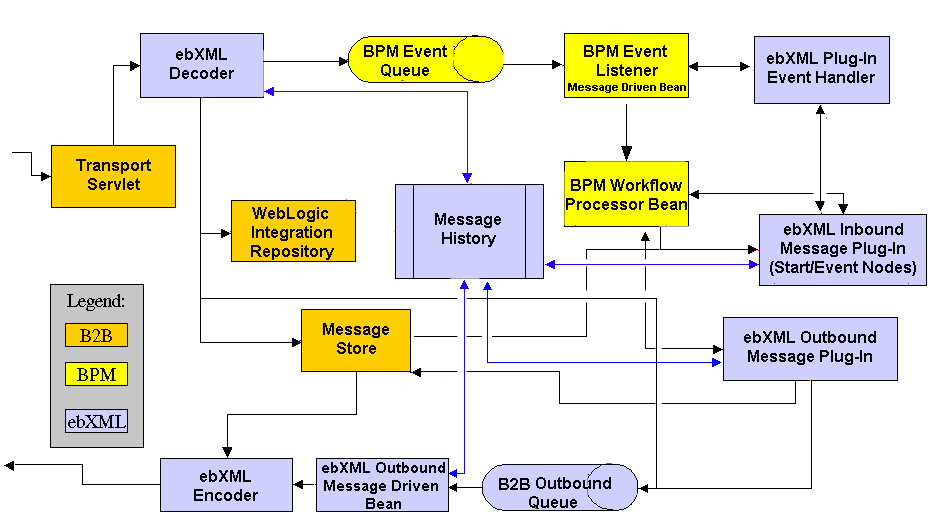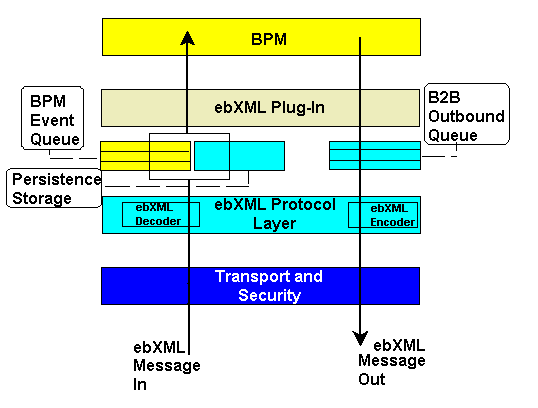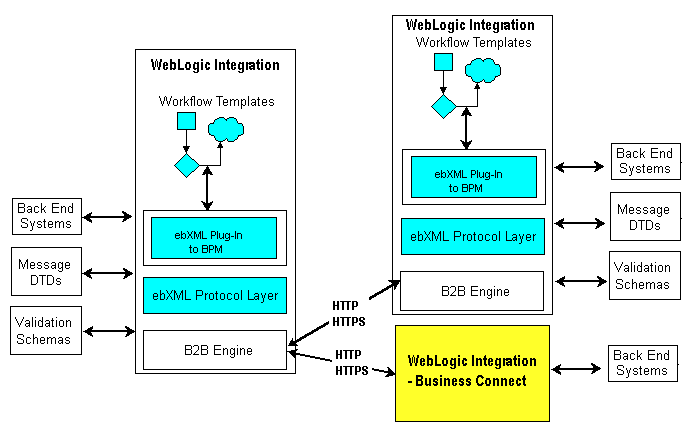

| Download Docs | Site Map | Glossary | |
|
|
|||
| bea.com | products | dev2dev | support | askBEA |
 |
 |
|
|||||||
| e-docs > WebLogic Platform > WebLogic Integration > B2B Topics > Implementing ebXML > Introduction |
|
Implementing ebXML
|
Introduction
WebLogic Integration supports a routing architecture that allows it to manage the exchange of XOCP, RosettaNet, cXML, and ebXML messages. Trading partners using WebLogic Integration can therefore exchange business messages using any of these business protocols.
WebLogic Integration supports the ebXML Message Service Specification v1.0, which defines the message enveloping and header document schema used to transfer ebXML messages with a communication protocol such as HTTP. In addition, WebLogic Integration supports the creation and execution of workflows that model ebXML business messages.
The following sections provide an overview of the ebXML business protocol and its implementation in WebLogic Integration:
About ebXML
The ebXML business protocol is sponsored by UN/CEFACT and OASIS. The ebXML Web site (http://www.ebxml.org) describes ebXML as "a modular suite of specifications that enables enterprises of any size and in any geographical location to conduct business over the Internet. Using ebXML, companies now have a standard method to exchange business messages, conduct trading relationships, communicate data in common terms and define and register business processes."
The ebXML Message Service Specification supported by WebLogic Integration is a set of layered extensions to the base Simple Object Access Protocol (SOAP) and SOAP Messages with Attachments specifications. The ebXML Message Service provides security and reliability features that are not provided in the specifications for SOAP and SOAP Messages with Attachments.
The ebXML Message Service Specification v1.0:
Information about the ebXML business protocol, including ebXML Message Service Specification v1.0, can be found at the ebXML Web site (http://www.ebxml.org).
Information about SOAP, including the following documents, can be found at the World Wide Web Consortium (W3C) Web site (http://www.w3c.org):
WebLogic Integration Architecture and ebXML
WebLogic Integration support for ebXML consists of the following components:
Business protocol definitions provide support for the ebXML protocol in WebLogic Integration.
The ebXML plug-in extends the functionality of the WebLogic Integration Studio and the process engine by supporting the modeling and execution of workflows that, in turn, support ebXML messaging.
A trading partner that deploys WebLogic Integration can use ebXML to interoperate with a trading partner that deploys WebLogic Integration - Business Connect. WebLogic Integration - Business Connect is a lightweight client that can be deployed in a few hours, enabling enterprises to enlist new business partners quickly by eliminating their barriers to entry.
For information about WebLogic Integration - Business Connect, see Using WebLogic Integration - Business Connect.
In WebLogic Integration, the ebXML plug-in, the workflows, the process engine, and the B2B engine work in concert to provide the following capabilities:
The following figure illustrates WebLogic Integration ebXML architectural components.
Figure 1-1 WebLogic Integration ebXML Architecture
The following figure illustrates how ebXML messages are processed by WebLogic Integration. (For information about how WebLogic Integration - Business Connect processes messages, see Using ebXML" in Using WebLogic Integration - Business Connect.) Figure 1-2 ebXML Message Processing in WebLogic Integration
The following sections describe the components illustrated in the preceding figures. ebXML Protocol Layer The ebXML protocol layer provides the ability to send and receive messages via the Internet according to the ebXML Message Service specifications for transport, message packaging, and security. Logic plug-ins are Java classes that can intercept and process business messages at run time. (For information about logic plug-ins, see Programming Logic Plug-Ins for B2B Integration.) The ebXML business protocol is associated with two logic plug-ins: an ebXML decoder and an ebXML encoder. When a WebLogic Integration trading partner receives an ebXML message, the transport servlet forwards the message to the ebXML decoder. The ebXML decoder processes the protocol-specific message headers, identifies the trading partner that sent the message, and forwards the ebXML message to a BPM event queue. When a WebLogic Integration trading partner sends an ebXML message, the ebXML encoder takes the message from the send-side B2B outbound event queue and forwards it to the transport service. The ebXML Message Service Specification v1.0 is independent of the communication protocol used. WebLogic Integration supports the HTTP(S) communication protocol. Security The SSL protocol with mutual authentication (HTTPS) can be used to support an ebXML conversation between trading partners. The SSL protocol provides secure connections by: 
For information about configuring security for ebXML business transactions, see Configuring Security.
ebXML Plug-In to BPM
The WebLogic Integration Studio is a key tool that supports business process management (BPM) in the WebLogic Integration environment. It provides the functionality needed by integration specialists to design, run, and maintain complex e-business processes that integrate existing enterprise systems, cross-enterprise applications, and human decision makers.
As described in Using Workflows with ebXML, an ebXML plug-in to BPM provides the functionality needed to design and monitor workflows that can choreograph ebXML business processes and the associated message exchange.
WebLogic Integration Repository
The WebLogic Integration repository is the database that stores the information required by WebLogic Integration. For information about the WebLogic Integration repository, see Working with the Repository in Administering B2B Integration.
WebLogic Integration - Business Connect
The ebXML business protocol is supported by WebLogic Integration in two scenarios:
The following figure shows possible trading partner configurations for ebXML message exchange.
Figure 1-3 WebLogic Integration ebXML Trading Partner Configurations
WebLogic Integration - Business Connect is a lightweight client that implements the ebXML business protocol. It can be deployed in a few hours, enabling BEA customers to rapidly establish and develop B2B relationships with trading partners with a minimal investment in time, technology, and resources. Thus trading partners of all sizes can participate in e-commerce trading communities. For information about installing and using WebLogic Integration - Business Connect, see Using WebLogic Integration - Business Connect.

|

|

|